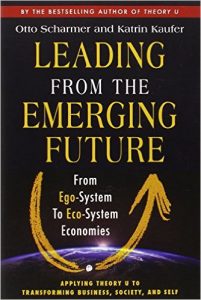 Leading from the Emerging Future: From Ego-System to Eco-System Economies by Otto Scharmer & Katrin Kaufer
Leading from the Emerging Future: From Ego-System to Eco-System Economies by Otto Scharmer & Katrin Kaufer
Reviewed by Keith Beasley
Any book that quotes Thich Nhat Hanh and Master Nan’s reinterpretation of Confucius’s Great Learning in a discourse on the evolution of Economics and Business has to be worth at least a second look. In fact I read it (very nearly) cover to cover. As someone who fine-tuned the art of rapid reading and scanning of books during my PhD, this is huge compliment to Otto Scharmer (a senior lecturer at MIT) and Katrin Kaufer, co-founder with Scharmer, of the Presencing Institute.
Charting the formation of the ecological, social and spiritual-cultural divides, the authors identify the underlying disconnects in the various systems that have, until recently, kept the world’s governments and businesses running. This message is not new, but this presentation of it is both succinct, readable and, most importantly, offers a solution that not just satisfies logic but also heart and soul. Even more usefully, they include many real-world examples of how their ‘presencing’ and ‘Theory U’ approaches have led to major shifts in how old-paradigm organisations have becomes shining examples of what can happen when all parties co-sense and work with the new future which they are convinced is emerging. In many ways this book reflects many of the themes of my own thesis: how courage and compassion, feeling a situation from another’s perspective and connecting to our common humanity is essential in changing behaviours.
The trouble with many books, no matter how insightful or full of worthwhile ideas they might be, is that they’re taken in as facts and theories and remain in our minds as just that and no more. This book practices what it preaches: describing a way of co-creating a more aware, connected, future; enabling and encouraging the application of the theory in the real world and daily lives. It does this in a number of ways. Firstly it is linked to a free on-line course which itself is linked to U-Lab (see www.presencing.com/ulab/overview ) which encourages students of the course to meet with fellow students in their locality and apply the theory to their own communities or organisations.
Secondly, each chapter includes a ‘Conclusion and Practices’ section which prompts you, the reader and student, to reflect on key issues and personalise the ideas presented in a journal. Then you are asked to share your perspective with your group and suggest ways of ‘prototyping’ what you’ve learnt, in your own office, home, organisation or community. Thus, the gist of the text, which emphasis experiential, inner engagement over objective analysis, is immediately grounded in practical application.
There are, of course, many alternative approaches to the specific processes and techniques offered by Scharmer & Kaufer, but they do admit that the intent in such activities is usually far more important than the detailed procedures. That being said, the exercises given and support provided by U-Lab and its local hubs, when added to the theories and insights in this book, together offer a rare, workable, approach to turning an ego-based organisation to one in tune with the needs of society and the planet as a whole. If the idea of an ‘emerging future’, to replace our current dying reality, appeals to you, then don’t just read this book: open your heart and mind and you’ll find others you can work with to co-create it!
Keith Beasley is course director at the Body Mind Institute (www.bodymindinstitute.com)
